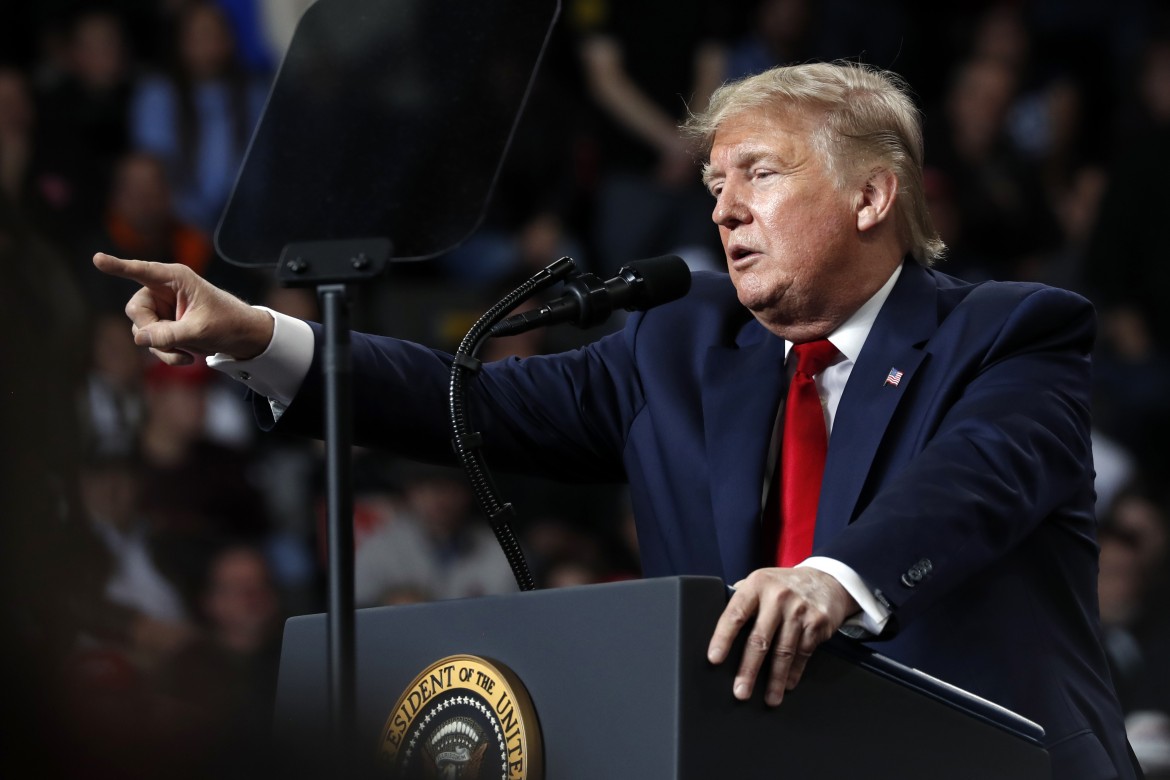Commentary
The Trump doctrine, if there is one: permanent conflict against Iran
The supposedly isolationist, verbally raucous and pathologically narcissistic US president appears completely disinterested in pursuing any strategies that go beyond the rhetorical proclamation of a decidedly phallic type of superiority. 'Our missiles are big.'

John Kerry’s criticism, in an op-ed in the New York Times, of Trump’s manufactured crisis with Iran might be seen as entirely predictable—especially as Kerry himself was one of the people directly responsible for the anti-proliferation agreement with Tehran ratified three years ago after months of difficult negotiations. Predictable, perhaps, but also fundamentally true as it highlights a simple reality: from the very outset, the withdrawal from this stability treaty was tantamount to a choice for war.
As Obama’s Secretary of State rightly points out, after Trump’s treacherous and unilateral abandonment of the agreement, events proceeded along a one-way street that predictably led to last week’s developments: the assassination of Soleimani and the pointless tragedy of the downing of a civilian airliner, mirroring the tragedy that took place in 1988, when a civilian plane was shot down by American missiles over the Strait of Hormuz. Those who paid the price were, once again, the passengers—innocent bystanders.
This escalation was the direct result of the mixture of incompetence and indifference that characterizes the present White House: an absurdly unjustified flare-up of hostilities, with no rationale beyond the most transient of internal political motives. Indeed, one is still unable to discern any design behind Trump’s geopolitical outbursts, both the most recent ones and those that took place further back, such as the spur-of-the-moment bombing of the Syrian air base at Sharyat in 2017, likewise a thoughtless and impulsive act.
The supposedly isolationist, verbally raucous and pathologically narcissistic US president appears completely disinterested in pursuing any strategies that go beyond the rhetorical proclamation of a decidedly phallic type of superiority. “Our missiles are big,” he declared in his speech to the nation—aimed at no one but his direct supporters—with the machismo of a soap opera villain, receiving in turn rapturous applause from Fox News and the conservative media, which is fully mobilized for war.
We don’t have to delude ourselves about the supposed pacifism of the previous administration to recognize that the JCPOA had been one of the few points of discontinuity with the stubborn, one-note Middle East policy which has been pursued by the US since after WWII. True, Obama was also responsible for empowering the special forces and the CIA to wage stealth war via drone attacks. However, the agreement with Tehran on nuclear power, the result of a prolonged and multilateral diplomatic effort, was, objectively speaking, a creative initiative that was able to put a dent in the Washington-Jerusalem-Riyadh axis (which uncoincidentally led to the permanent hostility toward Obama on the part of Netanyahu and the Saudis). The independent peace with the Shiite pole of the region was the first innovative act against the background of an oil-focused and blindly pro-Israel doctrine that had been the same for decades.
However, Trump—who has blatantly colluded with, and is indebted to, the Saudi dynasty—took care to restore the “balance” from his very first moves as president. With the US embassy moved to Jerusalem and dialogue with “the enemy” cut off, the discourse about the Middle East in the US has returned to being merely something to stoke up supporters with at political rallies.
The speed with which the nation has returned to this status quo ante is truly dispiriting. The country’s historical memory has been readjusted in an Orwellian manner to focus on the plight of the US hostages held in Iran in ‘79 (while carefully expunging every trace of the historical context, from Mossadegh to Iran-Contra). With the memory wiped clean, the “crisis” has been reinterpreted in the most simplistic terms possible, easily digestible by the base, which needs to be stoked up for the elections.
We are seeing a full-throated turn back to neocon rhetoric, or rather to the Reagan-era rhetoric built up around the Cold War and “rogue states.” The official statements have taken on a tone recalling the Vietnam era; however, fifty years after Sergeant Calley was brought to justice for the My Lai massacre that outraged the country, the sadistic Navy Seal sniper Edward Gallagher, court-martialed for shooting Iraqi girls, has now been pardoned and invited to the White House. Trump’s nation has retreated into the well-trod furrow of a militaristic McCarthyism that invokes national interests as a justification that can never be questioned.
In the media echo chamber, all logical analysis is submerged under the deluge of accusations of high treason from the right. Even worse, the mainstream media, which is still not up to the task (and whose authority has been further eroded by social media), risks being confined to the role of a mere spectator, as it was during the run-up to the invasion of Iraq, with journalists reduced to color commentators, offering laid-back remarks on the etiquette of targeted assassination, transformed into unlikely rationalizers of the acts of a dangerously mentally unstable demagogue, who has not yet run into any effective constitutional limits to his excesses.
These days, many have wasted their efforts to produce analyses on the strategic pros and cons of the assassination of Solemaini, on the unquestioned assumption that the right to do such things is an implicit prerogative of the new American hegemonism, established on the basis of its disproportional technological supremacy. In the Trumpist era, such asymmetrical warfare is also accompanied by a moral imbalance: a chasm of irresponsibility.
In the end, perhaps the idea that the new authoritarian and nationalist-populist US wants to put forward is none other than the evolution of permanent conflict into permanent terror, guaranteed by the standing kill list that can always be updated by the only power with lethal weapons which can be deployed by remote control. A “Trump doctrine,” if ever there was one.
Originally published at https://ilmanifesto.it/dottrina-trump-se-ne-esistesse-una-evoluzione-del-conflitto-permanente/ on 2020-01-14
